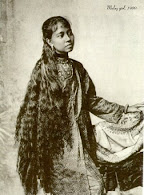Kangah stands on the north bank of the Parlis river, and, like other towns in this country, has only just enough clear ground round it to afford room for the growth of such rice, fruit, and vegetables as were required forthe consumption of the inhabitants—the unreclaimed junglesweeping round the cultivated land and orchards in a great curve, whose radius might possibly be a mile and a half.The houses were for the most part detached, standingin little gardens, or amongst pretty clusters of cocoa-nutand Penang (or betel-nut) palms, as well as many other trees peculiar to this country : not the least pleasing of these was the graceful banana, which overshadowed almost every abode, and its deliciously cold-looking darkgreen leaf was very grateful to the sight.It is almost impossible to convey a good idea of the beauty and neatness of abodes entirely constructed of wood, bamboo, and matting or leaves. ' Those of Kangah, although far above the river, were, according to the constant rule, built upon piles three to four feet high ; possibly this might be a necessary measure for the rainy season, but at that time, when the earth was baked as hard as rock, it seemed an act of supererogation. They, however, were generally oblong in the ground-plan, having a gallery extending along each of the long sides, to which a primitive ladder gave access from the ground.The floor (for each house was only one storey high) consisted of strips of bamboo, sufficiently strong to bear the weight, but giving a pleasant spring to the tread ; over these bamboos, which were perhaps an inch apart, and kept so by a transverse " snaking " of strips of ratan, neat mats were spread, their number, fineness, and beauty depending upon the wealth of the owner and the skill of his women. The walls were constructed of cocoa-nut and other palm leaves, secured with such cunning and neatness as to be perfectly wind and water tight, and at the same time pleasing to the eye. The roofs were somewhat high and peaked, betokening heavy rains, and with broad overhanging eaves, which added to the picturesque appearance of the buildings, and reminded me strongly of the chalets in Switzerland. In some cases the houses were divided into two or more apartments, and the balcony then served as a means of communication between one room and the other, besides being at all times the favourite lounge of the inhabitants.In the centre of the town a mosque-like building rose amongst the trees, and proved that, although the many pretty houses scattered about might be as evanescent as their fragile construction indicated, nevertheless the site of Kangah had, in Siamese as well as in Malay annals, been always considered that of a town.The bazaar consisted of one narrow street, running at right angles to the river. Each shop had a sloping and open front, well shielded from the heat of the sun, on which was displayed the thousand strong-smelling fruits and vegetables, the gaudy Manchester prints, glaring red and yellow handkerchiefs, pretty mats and neat kagangs, piles of rice and tubs of ghee, handsome creeses, and formidable swords or choppers, which may be seen in all bazaars of Singapore, Malacca, or Penang. There wereMahometan natives of the Madras Presidency, swathed in turbans and robes of calico—the embodied forms ofthe Great Moguls which figure on our playing-cards ;greasy, black, and very strong-smelling Klings chattered, lied, and cheated as Klings only can do ; Malays swaggered about, decked out in gay attire, and sporting beautifularms and silver-mounted spears, looking so saucy and bold that one felt half inclined to pat them on the back, and say, "Well done!" for they knew as well as we did that their hour had struck, and all the scene would soon be dissipated like a dream, and they be pirating elsewhere. A few Chinese, the Jews of the Eastern Archipelago, were there also. They were so obsequious, so anxious to attract the attention of a British midshipman,that he, with all the dignity of that proud caste, allowed them to change a dollar for him. The Chinese were mostly money-changers. The insolent contumely they endured at the hands of the Malays struck me much. The natives of India, when ill-treated, chattered like a nest of rooks. Not so the Chinese : they bore it with cringing and shrinking; but one could see, by the twinkle of their little glittering eyes, that they only abided their time to bite the heel that bruised them. No one could have supposed, from the scene in the bazaar, that fifteen thousand Siamese were close at hand,ready to impale, disembowel, or play any of the many pranks I have elsewhere related, upon each or all of those before me.People, however, in the East, live with their lives in ; their hands ; and, most of all, such a floating population as that of Kangah, consisting of pirates and those bloodsuckers who lived upon them, wretches who fattened alike upon them and their prey.
An English Midshipman's account of the Kedah Blockade of 1838 : Sherard Osborn was a junior naval officer in one of the British warships blockading Kedah in support of Siamese efforts in 1838 to re-conquer the State and capture the last Malay stronghold at Kuala Kedah fort. This narrative is based on accounts from his book ' The Blockade of Kedah in 1838: A Midshipman's Exploits in Malayan Waters' . Published in 1857, it not only provided an eyewitness account of the events surrounding the conflict but also revealed his growing admiration not only for his Malay crewmen but also the Kedah Malays he was supposedly at war with.




No comments:
Post a Comment